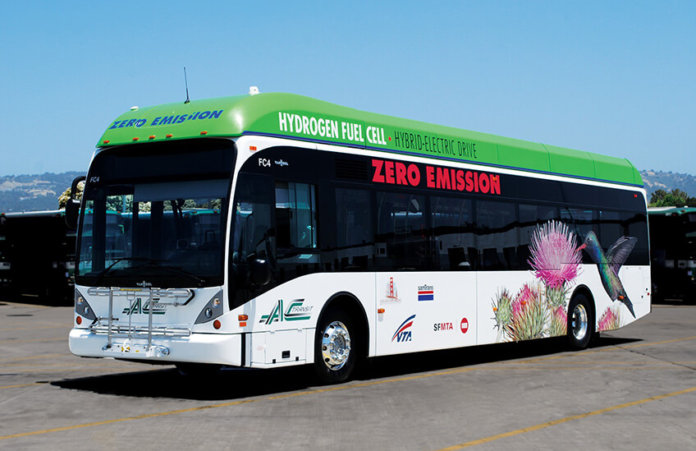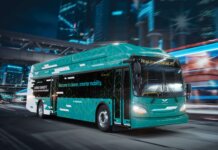Following an evaluation of hydrogen fuel cell electric buses (FCEBs) at Alameda Contra-Costa Transit District (AC Transit) in California, the U.S. Department of Energy’s National Renewable Energy Laboratory (NREL) says FCEBs have made significant progress toward commercialization. In fact, NREL says the technology, under this evaluation, has surpassed the DOE’s ultimate technical targets for fuel cell operating hours and reliability.
NREL collects and analyzes transit agency data to validate FCEB performance and costs as compared to DOE and U.S. Department of Transportation (DOT) targets and other transit technologies (e.g., diesel or compressed natural gas). The DOE’s Fuel Cell Technologies Office (FCTO) – part of the Office of Energy Efficiency and Renewable Energy – and the DOT’s Federal Transit Administration fund NREL’s evaluations.
In a recent FCTO webinar, Leslie Eudy, NREL’s project lead for FCEB evaluations, presented data and accomplishments from several demonstration projects, including for AC Transit. This transit agency operates the largest FCEB fleet in NREL’s evaluation project; it has 13 advanced-design fuel cell buses and two hydrogen fueling stations.
AC Transit shares FCEB data with the NREL team, including fuel cell hours, fueling records and roadcalls. Two results – fuel cell hour accumulation and reliability – have surpassed DOE-DOT technical targets. As of April, two fuel cell systems in AC Transit’s FCEBs exceeded the DOE-DOT fuel cell hour ultimate target of 25,000 hours accumulated, and all but one bus exceeded the DOE-DOT interim target of 18,000 hours.
NREL explains that it measures fuel cell reliability as miles between roadcalls (MBRC). The cumulative fuel cell system-related MBRC in AC Transit’s FCEB fleet surpassed the ultimate target with 24,200 MBRC as of January. DOE-DOT targets for reliability are 15,000 miles for the interim target and 20,000 for the ultimate target, according to NREL.
The laboratory says AC Transit had another notable achievement – the successful transition of all FCEB maintenance work to transit staff. While maintaining FCEB buses each day, in-house AC Transit staff can anticipate, troubleshoot and repair issues before they cause an in-service failure. NREL says this increases reliability and reduces labor costs as the staff becomes more familiar with the systems – both of which help drive competition with conventional and other zero-emission transit technologies.
Although the detailed evaluation of AC Transit’s current fleet has ended, fuel cell hours accumulated will continue to be tracked, notes NREL.






